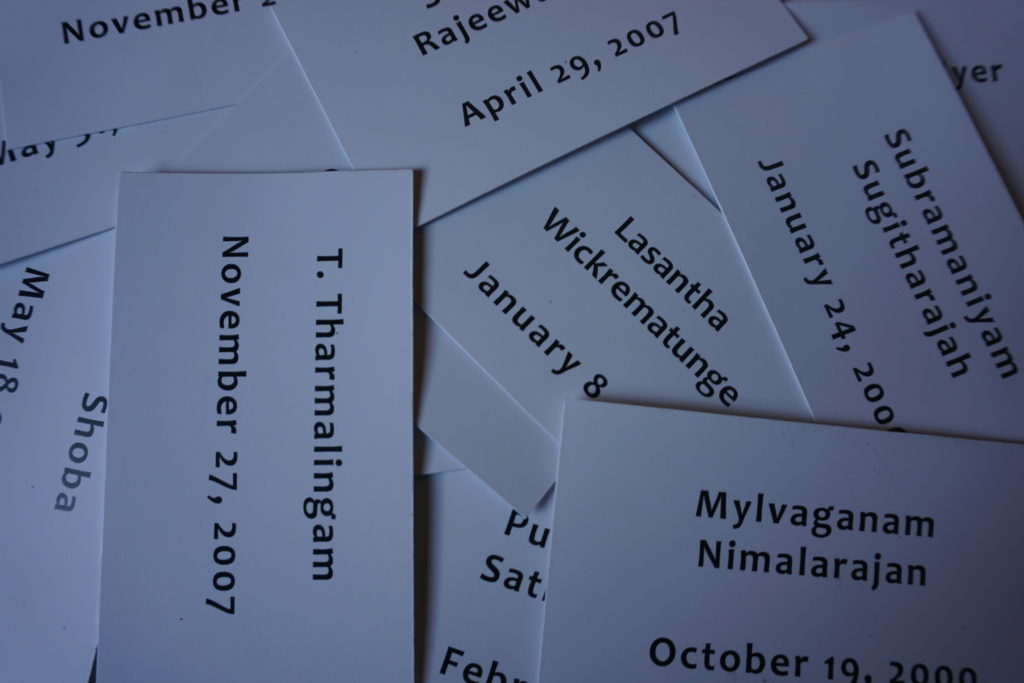Featured image by Minal Wickrematunge
The first thing to catch my eye in Sandya Eknaligoda’s home was a comic book. It was an illustrated copy of Sherlock Holmes. Peeking out underneath was a leaflet bearing a familiar face – disappeared journalist Prageeth Eknaligoda.
The image was immediately poignant. I raised my camera and snapped a photo.
Tacked to the walls around us were posters, each marking a milestone in Sandya’s long, tireless struggle for answers about her husband’s disappearance. Prageeth smiled down at us from the walls, with a phone clamped to his ear. Holding his then young son. The overwhelming sensation I had was of a life that had been paused indefinitely.
It was a sensation I recognised.
Later on, as Sandya spoke about the many journalists whose deaths remained unresolved, I felt a jolt when she mentioned my Uncle’s (or Baappi, as my sister and I called him) name.
A few days later, walking into the Sunday Thinnakkural office to interview Editor Bharathi Rajanayagam, I felt a jolt when I saw, pinned to the notice board behind him, a poster featuring Baappi’s face.
It may sound naive to say this, but I had not expected to hear Baappi’s name. I was forever forgetting that he was a public figure – one whose smiling face appeared on billboards.
To me, Baappi was the person who always announced his arrival with a resounding yell that echoed through the house. Whose first stop was usually the kitchen, where he would poke his finger into whatever was bubbling on the stove.
Pinned next to Baappi’s face at the Sunday Thinnakkural was another’s. I had never heard his name before – Mylvaganam Nimalarajan. Bharathi would mention his name when speaking about the killings of Tamil journalists, which to date remain unresolved.
Later on, while writing the story that would eventually appear on Groundviews, I felt a pang of guilt that both Sandya and Bharathi should remember and speak up for Baappi, while I had never stopped to think of the names they mentioned. (indeed, I had never even heard some of the Tamil journalist’s names).
Each year on January 8, there is a memorial held at Baappi’s graveside. Until recently, I had never spoken at these services. I was afraid of breaking down while speaking, and in that state, fodder for peurile news bulletins.
For the first time, I understood what it felt like to be on the other side of the lens.
But as I continued working at Groundviews, I witnessed many acts of courage.
I watched as Sandya spoke at events again and again, pleading for answers on her husband’s disappearance. On January 4 last year, I read on Vikalpa how she had relentlessly pursued a contempt of court case against Gnanasara Thero after he whispered hateful words at her in open court, despite immense pressure.
In 2017, I met the families of the disappeared in Kilinochchi, Mullaitivu and Vavuniya who had been protesting day and night by the roadside, for two months.
I sat with families in Mullikulam protesting for the right to return to their homes. I listened to women from Mannar and Mullaitivu speak of the violence they had faced, with immense courage.
I was inspired by these, and countless other stories.
And in the end, these words from that final, well-known editorial,
“We have espoused unpopular causes, stood up for those too feeble to stand up for themselves, locked horns with the high and mighty so swollen with power that they have forgotten their roots, exposed corruption and the waste of your hard-earned tax rupees, and made sure that whatever the propaganda of the day, you were allowed to hear a contrary view.”
This sentence encapsulates principles Baappi firmly believed in. He spoke up often for “unpopular causes”.
He paid for his outspokenness dearly. And yet, I know he would never have chosen silence.
Last year, when I was asked to speak at the memorial, I finally said yes.
This year, there will be 19 cards placed at the graveside. 19 names. Nineteen families who feel the same electric jolt when the names of those absent are spoken. Baappi’s case is called emblematic, but the pain and loss from life cut suddenly and brutally short, is the same.
As much as Baappi relished being in the limelight, I know that he would approve.
And we owe it to his memory to keep standing for unpopular causes. Especially now.
